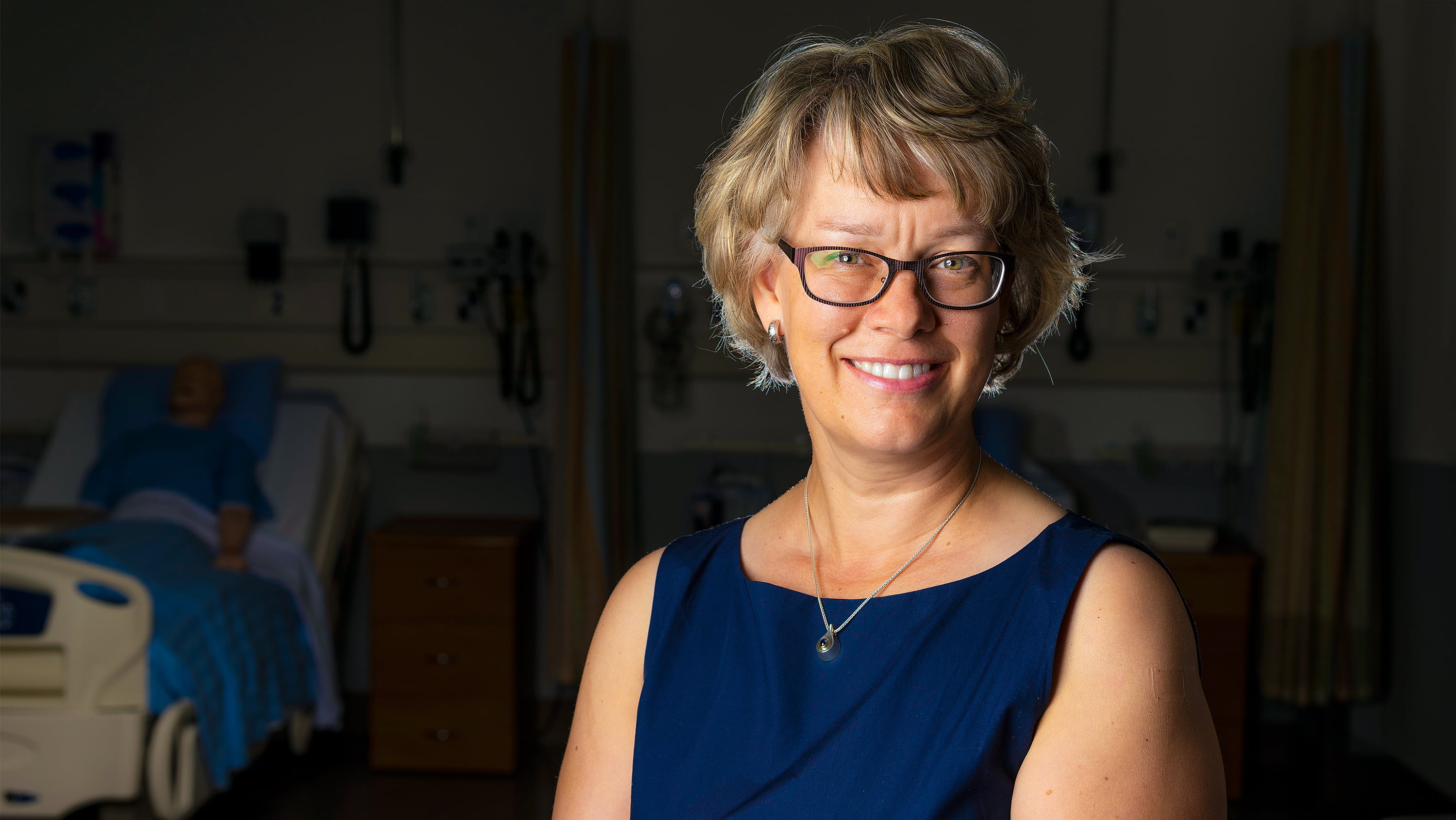Shannon MacDonald aims to build trust in vaccines — trust that was strained during the height of COVID-19 — so that more children can be protected from deadly infectious diseases.
MacDonald is an associate professor in the Faculty of Nursing and an adjunct professor in the School of Public Health, and she’s just been named the new Canada Research Chair in Applied Pediatric Immunization (Tier 2). She says many people who had never given vaccinations much thought became acutely aware of their life-saving benefits during the pandemic. But others were left with questions about the benefits and safety of vaccinations due to misinformation, polarization and inequitable access.
“We don’t want people to feel alienated because they have questions,” MacDonald says. “We need to say, ‘It’s great to have questions about your health and your health care. Let’s get you the information you need.’”
MacDonald’s research program focuses on figuring out the best ways, times and places to answer people’s questions and provide vaccines. She works with communities, health-care providers and policy-makers to develop best practices for vaccine delivery so that families can make informed decisions.
“The Canada Research Chair will allow me to continue to do that highly engaged research to answer questions from the people who are being immunized, the people who are doing the immunizing and the people who are developing the policies for immunization.”
Community-specific resources
A case in point: Since 2017, MacDonald has partnered with Bonny Graham, program manager of community health, diabetes and health promotions at Maskwacîs Health Services, which serves four First Nations about 70 kilometres south of Edmonton.
Their First Nations Childhood Immunization Project (FINCH) study, published last December, shows that children who receive their first dose of infant vaccines at the local clinic are more likely to continue the course than those who are vaccinated off-reserve. This insight was drawn from quantitative data made accessible thanks to a data-sharing agreement with the First Nations, as well as qualitative data on the ground.
“We interviewed parents and nurses, and all the health centre staff, to understand where the pressure points were in the system — what was hard for parents, what was hard for nurses, what was impacting their ability to access and provide immunizations,” MacDonald explains.
“We learned that when the nurses have a chance to connect with families very early in the child’s life and give that first dose of vaccine, there’s some building of trust and an increased likelihood that the child will come back for the subsequent doses.”
One limitation the team uncovered was that when parents had questions, most of the immunization materials handed out were developed by Health Canada or Alberta Health Services without direct reference to community needs.
To address the limitation, MacDonald and Graham co-created a video with input from parents, nurses and elders. Vaccines: A FINCH video for expectant parents is narrated by a Cree-speaking elder and answers questions that parents-to-be have about vaccinating their babies.
“Because of historical harms, medical maltreatment and ongoing racism, there is mistrust, so this video is specific to the community and directs people to Maskwacîs services and resources,” MacDonald says.
Targeting disease prevention
MacDonald’s recent research topics hint at the broad scope of her inquiries, which include COVID vaccine uptake among 5- to 11-year-olds in Alberta, the impact of maternal depression on vaccination rates of babies, and rates of human papillomavirus (HPV) vaccination among immigrant adolescents.
Her next joint project with Maskwacîs will focus on HPV and hepatitis B vaccines, which are given to Alberta’s school-aged children. She has another HPV-focused project underway in collaboration with the Métis Nation of Alberta.
MacDonald is co-principal investigator with the Canadian Immunization Research Network, which has just been awarded $15 million by the Canadian Institutes of Health Research to continue its work for the next five years. She works with two groups of researchers within the network: one that works with administrative health data to understand who is getting vaccinated and who is not; the other, social sciences and humanities experts who try to make sense of the reasons behind those trends.
The Canada Research Chair will ensure that MacDonald can continue this research leadership within Canada and abroad. It also means she can continue to recruit and train high-calibre graduate students, many of whom work part-time as research assistants on her team. She currently works with two staff and multiple students, including a postdoctoral fellow from Nigeria and a PhD student from Ghana. Other students include one who works in a local youth remand centre and another who works in a clinic for patients with sexually transmitted infections.
Many of the grad students are focused on improving uptake of the HPV vaccine, which prevents cervical, penile and other types of cancer. The vaccine is currently available for young people aged nine to 26 in Alberta. The World Health Organization recently dropped the recommended dose from two to one and Canada is expected to follow suit soon. MacDonald says the latest research shows that one dose is highly effective.
“If it means that people don’t have to come back to get a second dose, then we can vaccinate more people with the same amount of vaccine. When we vaccinate more people, we reduce the spread of infection,” says MacDonald, who is also a member of the Women and Children’s Health Research Institute.
New and renewed Canada Research Chairs at U of A
Along with MacDonald, three other University of Alberta researchers are among the latest new and renewed Canada Research Chairs:
Bipro Dhar, associate professor, Faculty of Engineering
New Canada Research Chair in Microbial Electrocatalysis for Energy and Environment (Tier 2)
Roman Pabayo, assistant professor, School of Public Health
Renewed Canada Research Chair in Social and Health Inequities (Tier 2)
Jessica Yue, associate professor, Faculty of Medicine & Dentistry
Renewed Canada Research Chair in Brain Regulation of Metabolism (Tier 2)
